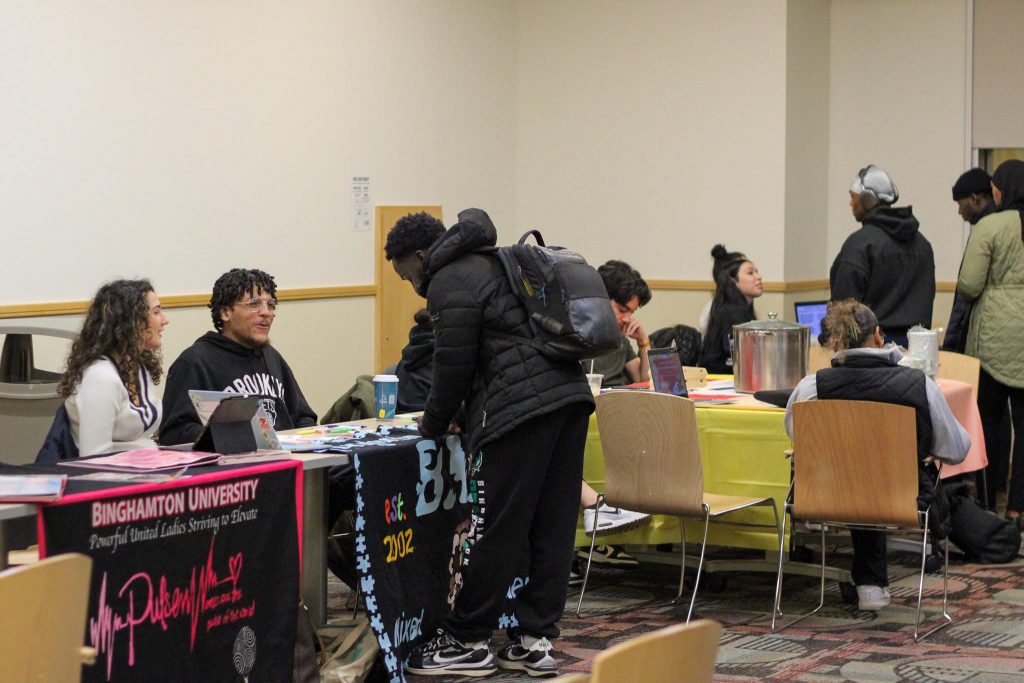On- and off-campus activists visited Binghamton University to educate the community about the dangers of medical racism on Monday.
Organized by the Lambda Zeta chapter of the Sigma Gamma Rho sorority, the “Fight Against COVID” event brought together a coalition of cultural organizations from the University’s campus. This included the Latin American Student Union (LASU), the Powerful United Ladies Striving to Elevate (P.U.L.S.E.), the National Association for the Advancement of Colored People (NAACP), the Binghamton Association of Mixed Students (BAMS) and the Thurgood Marshall Pre-Law Society. The intent behind the evening was to spread awareness about and highlight the impact of COVID-19 on communities of color, with an emphasis on vaccine hesitancy, according to an Instagram post from the sorority.
Marielle Joseph, basileus of the Lambda Zeta chapter and a senior double-majoring in human development and linguistics, described the sorority’s organizational mission and her conceptualization of the sense of duty felt by historically Black Greek institutions.
“My sisters and I have worked to make an impact on- and off-campus by not only doing our part to be revolutionary where we see fit, but by also being friendly faces on campus, which allows us to bridge that gap between those who are and aren’t Greek,” Joseph wrote in an email. “As a historically Black sorority, there is that added responsibility to champion prevalent issues like this one, not only because it affects us directly, but because we recognize that we do have power in numbers and our outreach is extraordinary because of this.”
According to the Centers for Disease Control and Prevention (CDC), a plethora of factors impact ethnic and racial minority groups’ just and equitable access to vaccines. These include gaps in health care coverage, prejudice in systems of public health and a fundamental lack of trust as a result of past medical racism.
Tara Delcarmen, a sophomore majoring in sociology, shared why they think initiatives and representation matter, especially at schools like BU.
“These types of outreach and awareness building events on campus provide students of color the space for education and for our voices to be heard,” Delcarmen wrote. “Additionally, having Black Greek life on campus, especially on campuses that are predominately white like [BU], is valuable and empowering because it demonstrates how [Black and Indigenous people of color] can be leaders and bring about positive and impactful change in their communities.”
Participating organizations tabled for the first portion of the evening. Stands were set up around the room touting individual club identities and information about how COVID-19 has impacted different vulnerable groups. Interactive displays included recipes for cultural food, informational slideshows with statistics on the impact of COVID-19 and a jeopardy game with questions about physical and mental health.
The event also featured a speech from Hajra Aziz, an adjunct lecturer at the University, the executive director of the Broome Community Land Trust and a parent-mentor coordinator for CARES — a local organization that “helps students and families of color in the Binghamton school district” with “social injustices,” according to the CARES website.
Aziz spoke about how COVID-19 impacted communities of color, especially Black ones, using CDC statistics to demonstrate how Black and Brown people are twice as likely to die compared to their white counterparts. She also described her advocacy work as a “sounding board” for people without a voice, like frontline workers who were at work and unable to help their children through the COVID-19 schooling experience.
“Fortunately, when [COVID-19] struck us all, I was employed in a position [where] I was able to work from home,” Aziz said. “I was immediately able to be there for my 9-year-old daughter who was doing remote learning. But I was also surrounded by many folks who did not have that opportunity or that privilege.”
Kayleigh McGeeney, a junior double-majoring in mathematics and history, gave her thoughts on how political events impact the need for COVID-19 education, and how the “Fight Against COVID” initiative contributed to filling that gap.
“I have to say it’s a really great event,” McGeeney wrote. “They have an amazing speaker tonight and I’m happy to see that so many clubs came out. This is a very important topic to discuss since it was both so recent and with the mask mandate no longer [in place], it seems like a lot of discussion has died off.”



